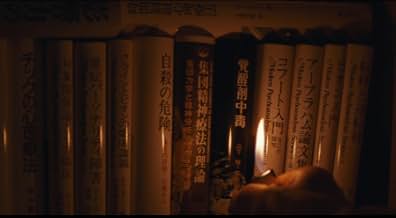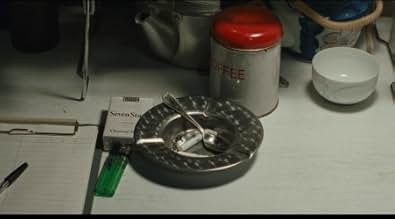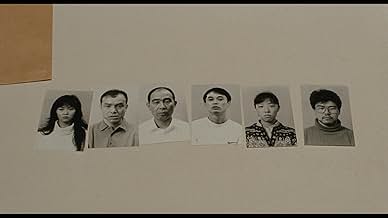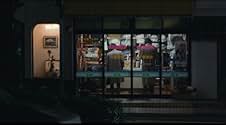A frustrated detective deals with the case of several gruesome murders committed by people who have no recollection of what they've done.A frustrated detective deals with the case of several gruesome murders committed by people who have no recollection of what they've done.A frustrated detective deals with the case of several gruesome murders committed by people who have no recollection of what they've done.
- Awards
- 9 wins & 2 nominations total
- Director
- Writer
- All cast & crew
- Production, box office & more at IMDbPro
Featured reviews
In the wake of the sarin-gas attack mounted by the Aum Shinrikyo cult on the Tokyo subway system in 1995, horror films enjoyed a sudden spurt of popularity in Japan. Many of the films focus on hypnosis or media-induced violence, the fragile normalcy of modern life, and grisly deeds committed by seemingly ordinary citizens. This unnerving 1997 thriller, which seems like a direct response to the Aum Shinrikyo incident, offers a glimpse of how our own national cinema may absorb the blow of the Sept. 11 terrorist attacks. A rash of senseless murders wracks Tokyo; the victims have deep X-shaped gashes across their throats, and the killers (often their loved ones) are found in a daze. The only connection appears to be a mysterious drifter (Masato Hagiwara) who gets into random strangers' heads with a single, oft-repeated question: "Who are you?" What makes this subtle, quiet shocker so unsettling is the idea that everyone has secret resentments that render him or her hypnotically pliable--that everyone harbors some glimmer of murderous rage that can be exploited, whether by a drifter or by religious extremists. The writer-director, Kiyoshi Kurosawa, a prolific Japanese filmmaker who's developing a large cult following here, heightens the unease with buzzing soundtrack noise and eerie long takes that leave us consistently unprepared for the violence to come. And the last sequence will leave people arguing--it requires close attention, culminating in an ending even more disturbing in its implications than the conclusion of SEVEN.
The serial killer movie has by now been done to death (so to speak), so it's especially rewarding to see this assured film that takes a truly ingenious approach. Kurosawa's protagonist is a seemingly dazed young man who, in spite of his aimless demeanor, is a master hypnotist. To reveal any more of what happens would be to give a bit too much away.
The subtlety and fluidity of this film is remarkable. The main character can be charming and simultaneously irritating when he speaks. He turns his speaking partner's question back on the speaker; he answers with vague phrases that nevertheless, over the course of the film, gradually bring out the complexity of his psyche. Pitting him against a cop whose wife seems to suffer from something like the hypnotist's 'brand' of mental wanderings underlines the thematic context of the film: what we know is almost certainly only what we think we know. And what we think we know is almost certainly based on someone else's 'knowledge', derived the same as ours.
That knowledge is a collective phenomenon, a shared and critical feature of the 'hive' is not a novel concept in film. But its presentation here is bold and original. To link that idea with a person who destroys life is a master stroke; it says that what we know vanishes in a suddenly extinguished flame, or a tiny stream of water that appears, runs, and then is seen no more.
This is a film that should definitely be added to the great films of the 90s. Since it was not released in the U.S. until 2001, I vote for it being one of the great films of that year here.
The subtlety and fluidity of this film is remarkable. The main character can be charming and simultaneously irritating when he speaks. He turns his speaking partner's question back on the speaker; he answers with vague phrases that nevertheless, over the course of the film, gradually bring out the complexity of his psyche. Pitting him against a cop whose wife seems to suffer from something like the hypnotist's 'brand' of mental wanderings underlines the thematic context of the film: what we know is almost certainly only what we think we know. And what we think we know is almost certainly based on someone else's 'knowledge', derived the same as ours.
That knowledge is a collective phenomenon, a shared and critical feature of the 'hive' is not a novel concept in film. But its presentation here is bold and original. To link that idea with a person who destroys life is a master stroke; it says that what we know vanishes in a suddenly extinguished flame, or a tiny stream of water that appears, runs, and then is seen no more.
This is a film that should definitely be added to the great films of the 90s. Since it was not released in the U.S. until 2001, I vote for it being one of the great films of that year here.
I think it is important to distinguish Cure from the avalanche of white-face-ghost-girl Japanese horror flicks that followed in Ringu's wake. Purely because it's a different beast and lumping it in a convenient J-horror niche is doing it a disservice. I won't go into plot specifics because it's only a skeleton for Kurosawa to hang his atmospherics. That said, I can understand the complaint many viewers seem to share ("man, it doesn't make sense") but without having any claims on solving Cure's riddle, I'm satisfied with letting wash over me, one watch at a time.
Kurosawa wisely doesn't attempt to explain his plot. He's content to lift the veil just enough for us to sneak a glimpse in before he disorients again. The plot slowly builds through little tokens that are never followed by an orchestral crescento to signal their arrival. They just happen. A small photo in a book, muffled words on a phonogram, an old video, the ramblings of an amnesiac, theories on 18th century Austrian doctors. In the course of the film, everything seems to be coming together only to remain elusive in the end. In that aspect I find Cure to be closer to Last Year at Marienbad than your average Ringu clone. It's not about making sense, it's about pushing limits within which you can. It's about soaking in the impression it makes. When muffled words come through a phonogram, they're more incoherent ramblings than a telegraphed plot solution; but they contribute just as well to the overarching feel. This elliptic mentality is abetted by Kurosawa's choice of a slow, deliberate pace and many long shots, entire scenes covered without any cuts. The gritty and rundown aspect of Tokyo is photographed like a more naturalistic version of David Fincher's work and does the job well.
It's my impression that a surrealist air hovers above and at the heart of Cure, at times reminiscent of a more languid version of Lynch. It is undoubtedly a horror movie so don't be put off by my Resnais comparison, but it's as much bleak as it is subtle and leaves enough to the mind's eye to make you carry it out with you.
Kurosawa wisely doesn't attempt to explain his plot. He's content to lift the veil just enough for us to sneak a glimpse in before he disorients again. The plot slowly builds through little tokens that are never followed by an orchestral crescento to signal their arrival. They just happen. A small photo in a book, muffled words on a phonogram, an old video, the ramblings of an amnesiac, theories on 18th century Austrian doctors. In the course of the film, everything seems to be coming together only to remain elusive in the end. In that aspect I find Cure to be closer to Last Year at Marienbad than your average Ringu clone. It's not about making sense, it's about pushing limits within which you can. It's about soaking in the impression it makes. When muffled words come through a phonogram, they're more incoherent ramblings than a telegraphed plot solution; but they contribute just as well to the overarching feel. This elliptic mentality is abetted by Kurosawa's choice of a slow, deliberate pace and many long shots, entire scenes covered without any cuts. The gritty and rundown aspect of Tokyo is photographed like a more naturalistic version of David Fincher's work and does the job well.
It's my impression that a surrealist air hovers above and at the heart of Cure, at times reminiscent of a more languid version of Lynch. It is undoubtedly a horror movie so don't be put off by my Resnais comparison, but it's as much bleak as it is subtle and leaves enough to the mind's eye to make you carry it out with you.
The only time I can recall being as spooked by a film was when my parents took me to see "Hangover Square" - a gothic Jack the Ripper thriller - when I was 8 years old. I guess they couldn't find a baby-sitter. That took me about a year to get over, a low-key, all-too-realistic chiller about the banality of insanity.
"Cure" is such a perfect depiction of madness that just about every shot could be framed & hung in a gallery. You can't analyze this one, it doesn't follow a cartesian line of logic; nor does it blast you with halloweenish surprises in the style of Elm Street & its knock-offs. This has far deeper & subtler impact. I found as I relaxed into this film that images of recurring dreams & nightmares I've had since childhood arose & blended into what I was watching. Can't get much creepier than that.
That said, the images & emotions that this film evokes are on a very high level of poetic art. One of the most impressive elements of "Cure" is the director's ability to convey the magnetic manipulative appeal of Mamiya - surely one of the scariest things in real life & very difficult to convincingly convey on screen.
"Cure" is such a perfect depiction of madness that just about every shot could be framed & hung in a gallery. You can't analyze this one, it doesn't follow a cartesian line of logic; nor does it blast you with halloweenish surprises in the style of Elm Street & its knock-offs. This has far deeper & subtler impact. I found as I relaxed into this film that images of recurring dreams & nightmares I've had since childhood arose & blended into what I was watching. Can't get much creepier than that.
That said, the images & emotions that this film evokes are on a very high level of poetic art. One of the most impressive elements of "Cure" is the director's ability to convey the magnetic manipulative appeal of Mamiya - surely one of the scariest things in real life & very difficult to convincingly convey on screen.
This film is like a Japanese "mate" to Se7en, although in many ways I think it's superior. The ending is rather enigmatic but if the implications are as I see them (no spoilers) then it is the ending I wish Se7en had gone for. Like many Japanese films I've seen, I get the impression that I'm missing things (cultural outlooks, social relationships) that the Japanese must see. But even knowing that it was a very disturbing film and the director knows how to add to it. It's an extremely dark film (in many ways) and near the end it sounded like something the entire movie was "breathing", like a demon close to your ear. A very eerie effect. Worth seeing.
Did you know
- Goofs(at around 51 mins) In Japan, they drive on the left side of the road and the steering wheel is on the right side of the car. In every scene in this picture that's the case - except one. When the detective leaves in his car to go to the hospital because Mamiya has turned up there, the steering wheel is on the left and he drives on the right side of the road.
- Quotes
Kunio Mamiya: All the things that used to be inside of me... now they are all outside.
- Crazy creditsThere are no opening credits, with the exception of the movie's title.
- ConnectionsEdited into Cure: or How to Be Happy While Saving the Species (2017)
- How long is Cure?Powered by Alexa
Details
Box office
- Budget
- ¥1,000,000 (estimated)
- Gross worldwide
- $232,829
- Runtime
- 1h 51m(111 min)
- Color
- Sound mix
- Aspect ratio
- 1.85 : 1
Contribute to this page
Suggest an edit or add missing content

![A mesmerising and hypnotic psychological thriller from Kiyoshi Kurosawa...
Released to critical acclaim in both the East and the West, CURE was a breakthrough film for director Kiyoshi Kurosawa, a nerve shredding thriller about the hunt for a serial killer in a bleak and decaying Tokyo.
A series of murders have been committed by ordinary people who claim to have had no control over their horrifying actions. Following the only link - a mysterious stranger who had brief contact with each perpetrator and their victim - detective Kenichi Takabe (Kôji Yakusho, 13 ASSASSINS, TOKYO SONATA) places his own sanity on the line as he tries to end the wave of inexplicable terror.
Described as one of the greatest films of all time by Bong Joon-ho (THE HOST, SNOWPIERCER), CURE is a deeply unsettling masterpiece of its genre, and has shockingly been unavailable on home video in the UK until now. The Masters of Cinema Series is proud to present Cure in a special Dual Format edition.
CURE [Kyua], Kiyoshi Kurosawa's mesmerising and hypnotic psychological thriller, is released on home video for the first time in the UK as part of The Masters of Cinemas Series in a Dual Format edition on 23 April 2018.](https://m.media-amazon.com/images/M/MV5BZjdlYmU3YTktZTQzNi00YWE5LTgzZjQtYmI3OTRkNTQyYTkxXkEyXkFqcGdeQXVyMTg2NTc4MzA@._V1_QL75_UX500_CR0)






















